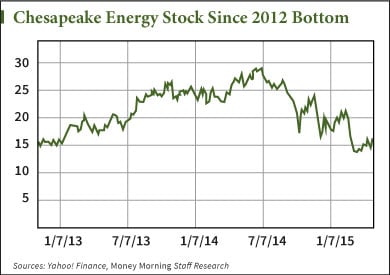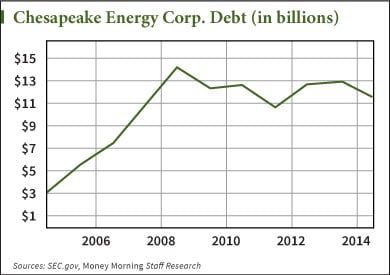Lately Chesapeake Energy Corp. (NYSE: CHK) stock has been getting some unwanted attention from short sellers. A lot of traders see CHK stock price weakness, and they want to profit from an anticipated fall.
 CHK's short float sits at 22.5%. That means of outstanding shares of CHK stock floated - those that are freely bought and sold without restriction -nearly one-quarter have bearish bets taken out on them. That compares to the S&P 500, which has an average short float of 3.7%.
CHK's short float sits at 22.5%. That means of outstanding shares of CHK stock floated - those that are freely bought and sold without restriction -nearly one-quarter have bearish bets taken out on them. That compares to the S&P 500, which has an average short float of 3.7%.
So, why is CHK stock so heavily shorted?
"Its combined market cap and high daily liquidity make it a short player's dream," Money Morning Global Energy Strategist Dr. Kent Moors said. Chesapeake has a market cap of $11 billion, and it trades 21 million shares on average daily.
No doubt, the short sellers have pummeled CHK stock. Traders saw a collapse in natural gas prices and began laying the short bets on CHK - the country's second-largest natural gas producer after Exxon Mobil Corp. (NYSE: XOM).
Natural gas prices topped out at $6.149 per million British thermal units (BTU) in February 2014. By last month, they had fallen $2.511 per million BTU - a nearly 60% decline.
From June 2014 to March 2015, CHK stock fell 54% from $29.07 to $13.42.
Chesapeake has since recouped a little bit of those losses. As of Friday, CHK stock was trading at $16.54.
Now investors are asking, "Should I buy CHK stock?"
One reason some will is they anticipate a short squeeze play - where a rise in the stock price forces short sellers to buy to cover their short position, adding a bigger pop to the end of any rally. Right now the short float remains elevated. But natural gas prices have regained slightly, meaning the March lows could signal a bottom. And CHK stock is trading at a very low 10.7 price-to-earnings ratio.
Another reason some will buy CHK stock is the company's takeover target potential. In this favorable M&A environment - which tends to take hold in the energy sector in an environment of low energy prices - Chesapeake could get swallowed up in a consolidation of the industry.
But here's what to consider before buying this natural gas giant...
What Investors Need to Know About CHK Stock
It's not just the liquidity of CHK stock that makes it a target for short sellers.
While liquidity is important - it helps match counterparties more easily for short selling - there's another, much bigger problem hampering the CHK stock price.
"The pricing dynamics of oil and gas combined with the heavy debt make a short-term breakout unlikely," Moors said.
This 23.4% gain CHK stock has made since hitting bottom in March looks like the only rally CHK stock will be able to muster. Moors noted that, "The bulk of that rise has been over the past three trading sessions." It gained nearly 15% in the last week.
The debt load is simply too much for the company to take advantage of any rallies in natural gas moving forward.
You see, former Chesapeake CEO Aubrey McClendon should surely be commended for his role in bringing on the U.S. shale revolution. He saw promise in 2004 when his shale assets, then an afterthought, began bringing in growing profits.
This prompted him to go on an aggressive buying spree to eat up as much shale acreage as he could across the country. Between 2004 and 2011, McClendon's rush to buy and drill in the Barnett Shale helped Chesapeake become the No. 1 driller of wells between 2004 and 2011, according to Russell Gold's 2014 book The Boom.
 But in the shale rush, McClendon became almost prolific in his ability to mount crushing debts. From 2004 to 2008, Chesapeake's debt grew from $3.1 billion to $14.2 billion.
But in the shale rush, McClendon became almost prolific in his ability to mount crushing debts. From 2004 to 2008, Chesapeake's debt grew from $3.1 billion to $14.2 billion.
The financial crisis as well as falling natural gas prices made it harder for Chesapeake to find financing. By a June 2012 shareholder meeting, the most visible display of growing investor discontent aimed at McClendon, Chesapeake debt was junk. McClendon was stripped of his role as chairman. He departed as CEO in January 2013.
Chesapeake has had to sell assets to bring down the debt, which fell to $11.5 billion at the end of 2014. This is still a problem for CHK stock.
"Chesapeake continues to carry a heavy debt load and has sold off some prime field assets at bargain basement prices in an attempt to get the debt under control," Moors said. "It also moved into oil from a primary reliance on natural gas only to hit last year's price plunge."
[epom key="ddec3ef33420ef7c9964a4695c349764" redirect="" sourceid="" imported="false"]
Moors added that in trying to pay off this debt, Chesapeake "has also cut forward capital expenditures significantly, making a production spike to match a price unlikely short term." That means if oil and natural gas have, in fact, hit bottom, Chesapeake isn't investing in the resources to drill more wells and take advantage.
The best chance right now for CHK stock is if a bigger company buys it up. But it's important to remember that talks of a buyout are not new for Chesapeake. As Gold's book points out, in that 2012 shareholder meeting, Vincent Intrieri, a deputy of famed activist investor Carl Icahn, suggested Chesapeake consider a sale - one that still hasn't happened.
And Chesapeake itself is not a particularly attractive purchase, should it find itself in the crosshairs of some energy M&A spree. The bulk of its issues stem from McClendon's legacy.
"McClendon put several poison pills in the corporate structure (persona payments, continuing control over profit aspects, etc.), making an acquisition of Chesapeake less appealing," Moors said. "That is even before one considers the debt repayment schedule and condition of current operating assets."
Jim Bach is an Associate Editor at Money Morning. You can follow him on Twitter @JimBach22.
Wonder how natural gas prices are determined? A lot of it comes down to the futures trading of natural gas contracts. The futures market for natural gas began in the early 1990s, and while most investors are aware how natural gas is used, not everyone understands how natural gas is traded. Here's our beginner's guide to natural gas futures...


